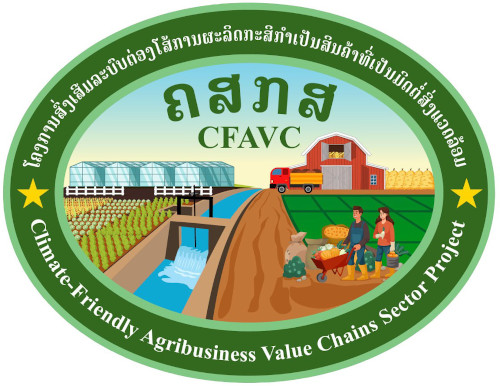About Us

ADB approved the Climate-Friendly Agribusiness Value Chains Sector Project (CFAVC) Project for a total of $46.37 million (Grant number: 0585) on 30 July 2018 and declared it effective on 5 December 2018. The project, to be implemented over a period of 6 years from October 2018 to September 2024, supports the implementation of the government’s Agriculture Development Strategy to 2025 (ADS) by boosting the competitiveness of rice value chains in Khammouane, Saravan, and Savannakhet provinces, and vegetable value chains in Vientiane Capital, Champasak, and Sekong provinces. The project will improve the climate resilience of agricultural infrastructure, and enhance crop productivity, diversification, and commercialization. It will help improve the capacity for storage, processing, quality, and safety testing, and promote the use of biofertilizers and organic farming. It will strengthen the capacity of farmers and agribusinesses for climate-smart agriculture (CSA), and create an enabling environment for climate-friendly agribusinesses to promote sustainability along the value chain.
Impact and Outcome
The project is aligned with the following impact: agricultural competitiveness improved.14 The project will have the following outcome: productive and resource efficient agribusiness value chains developed in project areas.15
Outputs
- Output 1: Critical agribusiness value chain infrastructure improved and made climate-resilient. It involves rehabilitation and modernization of critical infrastructure to increase production and resource efficiency, reduce post-harvest losses, and enhance value chain links while improving climate resilience. Key activities include (i) rehabilitating small scale irrigation infrastructure (tertiary canals and water retention ponds) and rural roads; (ii) enhancing crop research, protection and quality testing infrastructure; and (iii) improving climate-friendly value chain infrastructure for agribusiness enterprises. Under activity (ii) the project will upgrade the facilities and services offered to farmers by rice and vegetable research centers in target provinces. It will also improve infrastructure for quality and safety testing in plant protection laboratory of the Department of Agriculture, soil testing laboratory of the Department of Agricultural Land Management and provincial agricultural colleges. Under activity (iii), the project will support the upgrade of small to medium rice mills, vegetable pack houses and biofertilizer factories through a matching grant scheme. The grant receiving agribusinesses will need to adopt climate-friendly technologies and good manufacturing practices, and support smallholder farmers in employing CSA and good agricultural practices. Upgrading rice mills will improve rice recovery rates and allow separation of white and glutinous rice to improve access to premium domestic and export markets. Support for vegetable collection and marketing clusters will help reduce post-harvest losses and improve quality and quantity of vegetables to domestic and export markets. Upgrading biofertilizer factories will help in increasing organic fertilizer production and promotion of organic agriculture. The project will promote climate resilience through measures such as upgrading rural infrastructure design standards to withstand climate change impacts, promoting cross drainage, and increasing height of embankments. Sustainability of infrastructure is ensured through establishing an asset management system for rural infrastructure and implementing a holistic approach for operations and maintenance (O&M) focusing on institutions, capacity building, financing and technologies.
- Output 2: Climate smart agriculture and agribusiness promoted. Activities include (i) deploying climate-resilient rice and vegetable varieties; (ii) strengthening capacity of agricultural production groups (APGs) and agribusinesses in climate smart and organic agriculture; and (iii) promoting farm mechanization through a smallholder financing scheme to APGs. The project will disseminate flood and drought tolerant varieties of rice and vegetables, and train APGs on CSA, good agricultural practices, crop calendars, preparation of business plans and marketing. Agribusinesses will be trained on good manufacturing practices, safety standards, post-harvest crop handling to improve quality and market access, value addition through branding, packaging and agro-processing, and joint contract harvesting operations. Support to APGs for mechanization includes acquisition of small machinery for land clearance and levelling, planting, on-farm micro-irrigation, water storage, and application of agricultural inputs.
- Output 3: Enabling environment for climate-friendly agribusiness enhanced. The project will support the Ministry of Agriculture and Forestry and the Ministry of Industry and Commerce in creating an enabling policy environment to promote private sector investments through public-private partnerships, contract farming and formation of joint APG-agribusiness ventures. Key activities include (i) formulating climate-friendly agribusiness policies, including support for land registration and development of national standards for good agricultural practices, good manufacturing practices and organic certification; and (ii) promoting green finance and climate risk sharing mechanisms through raising awareness of financial institutions in integration of environmental and climate risk screening criteria into credit application and reporting procedures. It will also disseminate information on climate risk sharing mechanisms.
Implementation Arrangements
The project will be implemented over a period of 6 years with an overall value of $46.37 million. The Executing Agency is the Ministry of Agriculture and Forestry (MAF). Key Implementing Agencies within MAF are the (i) Department of Planning and Finance (DOPF); (ii) Department of Technical Extension and Agricultural Processing (DTEAP); (iii) Department of Agriculture (DOA); (iv) Department of Agricultural Land Management (DALAM); (v) Department of Irrigation (DOI); (vi) Department of Rural Development and Cooperatives (DRDC)17 and (vii) National Agriculture and Forestry Research Institute (NAFRI).



